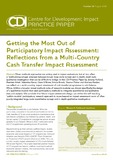Getting the Most Out of Participatory Impact Assessment: Reflections from a Multi-Country Cash Transfer Impact Assessment
| dc.contributor.author | Holland, Jeremy | |
| dc.contributor.author | Attah, Ramlatu | |
| dc.contributor.author | Barca, Valentina | |
| dc.contributor.author | O’Brien, Clare | |
| dc.contributor.author | Brook, Simon | |
| dc.contributor.author | Fisher, Eleanor | |
| dc.contributor.author | Kardan, Andrew | |
| dc.coverage.spatial | Ethiopia | en |
| dc.coverage.spatial | Ghana | en |
| dc.coverage.spatial | Kenya | en |
| dc.coverage.spatial | Lesotho | en |
| dc.coverage.spatial | Malawi | en |
| dc.coverage.spatial | Zimbabwe | en |
| dc.date.accessioned | 2018-08-01T09:13:44Z | |
| dc.date.available | 2018-08-01T09:13:44Z | |
| dc.date.issued | 2018-08 | |
| dc.identifier.citation | Holland, J.; Attah, R.; Barca, V.; O’Brien, C.; Brook, S.; Fisher, E. and Kardan, A. (2018) Getting the Most Out of Participatory Impact Assessment: Reflections from a Multi-Country Cash Transfer Impact Assessment, CDI Practice Paper 19, Brighton: IDS | en |
| dc.identifier.issn | 2053-0536 | |
| dc.identifier.uri | https://opendocs.ids.ac.uk/opendocs/handle/20.500.12413/13963 | |
| dc.description.abstract | Mixed methods approaches are widely used in impact evaluations, but all too often a ‘methodological gap’ emerges between broad, large-scale surveys and in-depth, small-scale qualitative investigation that can be difficult to bridge. In this CDI Practice Paper we reflect on a multi-country impact assessment of cash transfer programmes in sub-Saharan Africa. Within a broader mixed methods suite of research modules we discuss specifically the design of a qualitative module that used participatory methods to integrate quantitative and qualitative data and analysis. We conclude that future impact assessment design can utilise this self-standing ‘within‑module’ participatory research approach to move beyond an impact assessment norm of often poorly integrated large-scale quantitative surveys and in-depth qualitative investigation. | en |
| dc.language.iso | en | en |
| dc.publisher | IDS | en |
| dc.relation.ispartofseries | CDI Practice Paper;19 | |
| dc.rights | This is an Open Access paper distributed under the terms of the Creative Commons Attribution Non Commercial 4.0 International licence (CC BY-NC), which permits use, distribution and reproduction in any medium, provided the original authors and source are credited, any modifications or adaptations are indicated, and the work is not used for commercial purposes. http://creativecommons.org/licenses/by-nc/4.0/legalcode | en |
| dc.rights.uri | http://creativecommons.org/licenses/by-nc/4.0/ | en |
| dc.subject | Participation | en |
| dc.subject | Social Protection | en |
| dc.title | Getting the Most Out of Participatory Impact Assessment: Reflections from a Multi-Country Cash Transfer Impact Assessment | en |
| dc.type | CDI Practice Paper | en |
| dc.rights.holder | IDS | en |
| rioxxterms.funder | Default funder | en |
| rioxxterms.identifier.project | Default project | en |
| rioxxterms.version | VoR | en |
| rioxxterms.funder.project | 9ce4e4dc-26e9-4d78-96e9-15e4dcac0642 | en |
Files in this item
This item appears in the following Collection(s)
-
IDS Research [1663]
Except where otherwise noted, this item's license is described as This is an Open Access paper distributed under the terms of the Creative Commons Attribution Non Commercial 4.0 International licence (CC BY-NC), which permits use, distribution and reproduction in any medium, provided the original authors and source are credited, any modifications or adaptations are indicated, and the work is not used for commercial purposes. http://creativecommons.org/licenses/by-nc/4.0/legalcode


